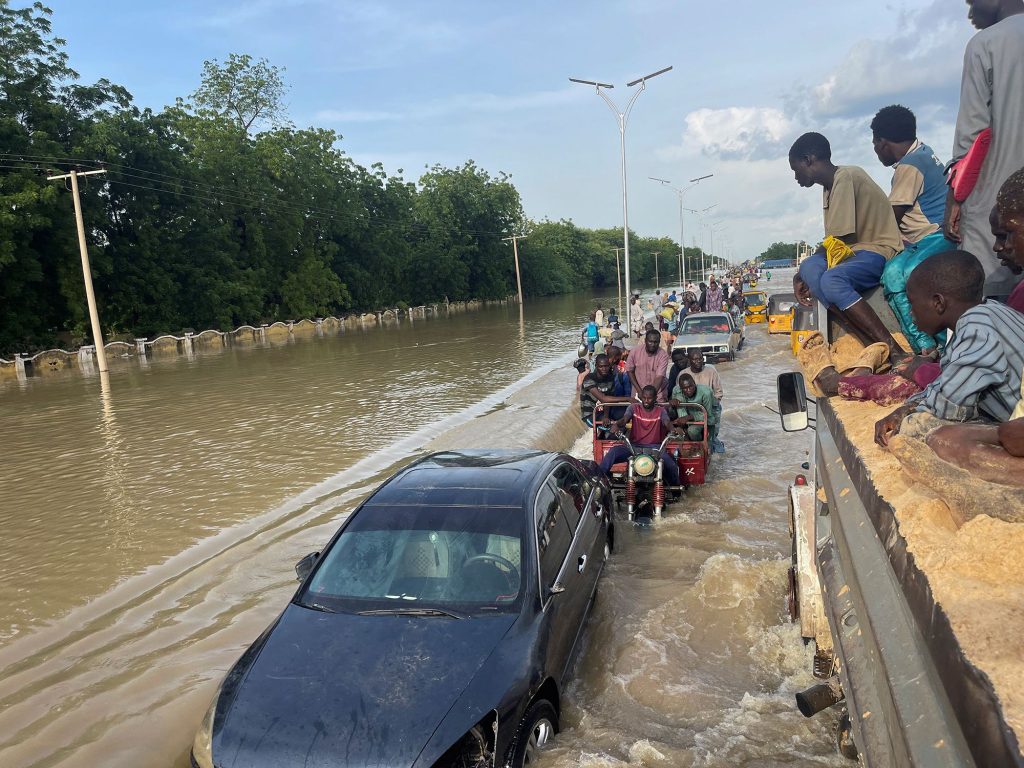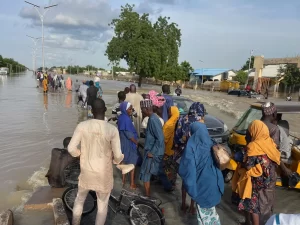More than 200 inmates escape as Nigerian prison wall collapses in floods
3 min read

In a dramatic turn of events in Nigeria’s Borno state, heavy flooding has resulted in the escape of at least 274 inmates from a local prison. This incident highlights the severe impact of recent flooding, which has claimed over 1,000 lives across western and central Africa, according to reports from aid agencies.
The Nigerian Correctional Service confirmed that while 281 inmates initially escaped during their transfer to a “safe and secure facility,” seven were subsequently recaptured. Abubakar Umar, a spokesman for the service, emphasized the gravity of the situation, noting that the floodwaters had compromised the structural integrity of the correctional facilities, including the Maiduguri Medium Security Custodial Center (MSCC) and the staff quarters in the city.
Umar reassured the public that the identities of the escapees, including their biometrics, were known to the authorities and that this information had been disseminated for public awareness. He indicated that efforts to recapture the remaining inmates were ongoing.
The flooding in Nigeria has been unprecedented, with recent data from the National Emergency Management Agency (NEMA) indicating that at least 269 people have died as a result of the natural disaster. Furthermore, over 640,000 individuals have been displaced, primarily in northern Nigeria, which has experienced the brunt of the floods. Borno state, located in the northeast region, has been particularly hard hit.
In light of the flooding crisis, the Nigeria Hydrological Services Agency (NIHSA) previously issued warnings regarding rising water levels in the Niger River, one of Nigeria’s largest waterways. As climate change continues to escalate, the Intergovernmental Panel on Climate Change has projected that extreme rainfall events are likely to become more frequent and intense across Africa, including Nigeria. This scenario poses significant risks to the region’s infrastructure and communities.
The impact of flooding extends beyond Nigeria’s borders, affecting neighboring countries in west and central Africa. Reports indicate that approximately 4 million people have been affected by the floods throughout the region. In Chad, media sources report at least 487 fatalities attributed to the flooding, while Niger has seen 265 deaths from similar incidents. Mali has also reported 55 fatalities linked to the floods.

Cameroon is not spared, with recent reports indicating up to 20 deaths due to flooding. The humanitarian situation is dire across northeastern Sudan as well, where at least 97 people have lost their lives to flood-related incidents, according to data from the UN Office for the Coordination of Humanitarian Affairs (OCHA).
In a striking incident related to the flooding, floodwaters from an overflowing dam in northern Nigeria inundated a zoo, releasing animals including crocodiles and snakes into surrounding communities. Such occurrences underline the chaotic and dangerous consequences of the extreme weather events affecting the region.
Local authorities are grappling with the aftermath of these floods, as they strive to provide support and assistance to displaced individuals and families. The long-term repercussions of the floods on communities and infrastructure are still unfolding, raising urgent concerns regarding disaster preparedness and response in the face of climate change.
As the situation develops, communities are coming together to assist those affected, but the challenges remain daunting. The Nigerian government, along with international aid organizations, is mobilizing resources to address the immediate needs of the displaced population while also planning for the recovery process.
The scale of the crisis calls for a comprehensive approach to disaster management, emphasizing the need for improved infrastructure, timely warnings, and effective response strategies to mitigate the impact of future flooding events.
As the search for the escaped inmates continues and recovery efforts unfold, the people of Nigeria and the surrounding regions face a challenging road ahead, underscoring the urgent need for resilience in the face of climate-induced disasters.